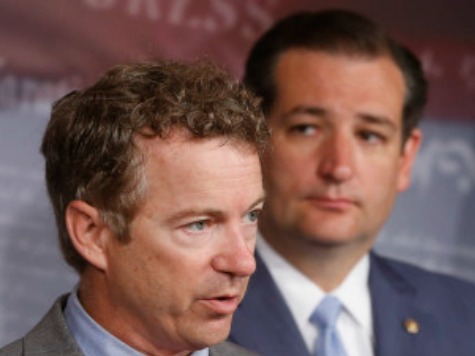Sens. Ted Cruz (R-TX) and Rand Paul (R-KY) have launched a national debate right here at Breitbart News, one that may mark the first shots of the 2016 Republican presidential primary campaign. The topic is foreign policy, oddly, an issue that is dominating the headlines lately but which remains secondary, at best, to many voters, particularly in the Tea Party movement from which both men emerged, which focuses on domestic concerns.
To some extent, the debate between Cruz and Paul is more about personality and positioning than policy. Paul seems to resent the way in which Cruz placed him at the far left of the Republican spectrum, using him as a foil in a speech at the “Uninvited II” conference co-sponsored by Breitbart News. Cruz has struck a more hawkish posture than Paul, who led a filibuster last year against the use of drones against Americans on U.S. soil.
And yet the tension between the two may be inherent in American democracy. Alexis de Tocquville, that great French observer of our political system, whose insights remain fresh nearly two centuries later, warned that war is a threat to liberty because it increases the power of the central government: “All those who seek to destroy the liberties of a democratic nation ought to know that war is the surest and the shortest means to accomplish it.”
At the same time, however, Tocqueville warned that free societies were uniquely susceptible to foreign invasion precisely because they resisted large-scale militarization, and because the general equality of social conditions meant that all an invading force had to do was conquer the capital city to create widespread chaos. Democratic nations would be more formidable in a protracted conflict, he said, but would be vulnerable to sudden attack.
It was partly for that reason that the U.S. built up a massive military presence around the world during the Cold War, to deter the opportunistic invasions of Soviet armies and proxies. We can see today just how vulnerable a small, newly free society like Ukraine is to invasion by a determined, autocratic neighbor. Other former Soviet republics are slightly less at risk only because we have extended military protection to them through NATO.
So freedom–at home and abroad–requires a strong military and global leadership. At the same time, a strong military may have negative consequences for liberty, as the ongoing NSA scandal reveals. This is a tension that is inherent in democratic society. It is therefore no surprise that Paul and Cruz find themselves on opposing sides of a debate in which they seem to agree with each other on the most basic level. The rest is just politics.

COMMENTS
Please let us know if you're having issues with commenting.